Are you experiencing symptoms of high cortisol levels? Lowering cortisol naturally is like giving your body a well-deserved vacation from stress. Cortisol, often dubbed the "stress hormone," plays a crucial role in how your body responds to pressure, but too much of it can leave you feeling anxious and fatigued and even impact your overall health.
The good news? You can dial down your cortisol levels without resorting to harsh methods. From nourishing your body with the right foods to taking supplements that lower cortisol to embracing mindfulness practices, there are plenty of holistic ways to keep cortisol in check.
What is Cortisol?
Cortisol, often called the 'stress hormone', is a steroid hormone produced by the adrenal glands. It plays a crucial role in our body's response to stress. When we encounter a stressful situation, our body releases cortisol to help us cope.
However, cortisol isn't just about stress. It's involved in a variety of bodily functions, including regulating blood sugar levels, metabolism, reducing inflammation, and even memory formation. It's a complex hormone with a wide range of effects.
But, like anything in life, balance is key. While cortisol is necessary for our survival, high levels can be detrimental to our health. This is especially true if these high levels persist over time.
High cortisol levels can lead to a number of health issues. These range from mental health problems to physical conditions. It's therefore important to understand what cortisol is, and how it impacts our health.
The Impact of High Cortisol Levels
High cortisol levels can wreak havoc on your mental health, leading to anxiety and depression. The adrenal gland, responsible for cortisol production, can go into overdrive during periods of chronic stress. This can result in a constant state of high cortisol levels, which can have far-reaching effects on your overall health.
One of the most significant impacts of high cortisol levels is on the immune system. The hormone can suppress the immune response, making you more susceptible to infections and diseases. High cortisol levels can lead to weight gain, particularly around the abdomen. This is because cortisol can increase appetite, leading to overeating. It can disrupt sleep patterns, leading to insomnia. This can create a vicious cycle, as lack of sleep can further elevate cortisol levels.
Other side effects may include:
- Chronic diseases: High cortisol levels can increase the risk of conditions such as high blood pressure, heart disease, type 2 diabetes, and osteoporosis.
- Weight gain: Cortisol can stimulate appetite and alter metabolism, leading to fat storage.
- Sleep disturbances: High cortisol can interfere with sleep hormones, affecting sleep quality and duration.
- Difficulty concentrating: Elevated cortisol levels can cause "brain fog," leading to problems with focus and mental clarity.
- Weakened immune system: Increased cortisol can hinder the immune system's ability to fight infections.
- Cushing syndrome: In rare cases, very high cortisol levels can lead to Cushing syndrome, a serious disease.
- Reduced sex drive and irregular periods in females: Prolonged high cortisol levels can lead to these issues.
- Mental health conditions: Conditions such as anxiety and depression can be triggered by high cortisol levels.
- Increased body hair in females, type 2 diabetes, and osteoporosis: These are some of the other potential health issues caused by high cortisol levels.
Natural Ways to Lower Your Cortisol
Stress has become a constant companion for many of us, leading to elevated cortisol levels. This 'stress hormone', while beneficial in short bursts, can have detrimental effects on our health when levels remain high for extended periods. From dietary changes to relaxation techniques, these methods aim to restore balance and promote overall well-being.
1. Reducing Stress to Lower Cortisol
Stress is a significant contributor to elevated cortisol levels. It's a biological response, a survival mechanism our bodies have developed over millennia. When we're under stress, our bodies produce more cortisol to help us cope. But in today's fast-paced world, stress is often chronic, and this constant production of cortisol can have detrimental effects on our health.
One of the most effective ways to lower your cortisol levels naturally is to reduce stress. This might sound easier said than done, but there are many strategies you can employ. Mindfulness and meditation are two such techniques that have been shown to significantly reduce cortisol levels. They work by helping you to focus on the present moment, reducing feelings of anxiety and stress.
Another effective strategy is to engage in activities that you enjoy. Whether it's reading a book, going for a walk, or spending time with loved ones, these activities can help to distract you from stressful thoughts and lower your cortisol levels.
It's also important to remember that everyone is different. What works for one person might not work for another. It's about finding what works best for you and incorporating it into your daily routine.
2. Relaxation Techniques for Lowering Cortisol
Relaxation techniques are a natural way to lower your cortisol levels. They help to reduce stress, which is a major contributor to high cortisol levels. Here are some techniques you can try:
- Mindfulness Meditation: This practice involves focusing on your breath and bringing your mind's attention to the present without drifting into concerns about the past or future. It's a method that can reduce cortisol levels significantly.
- Yoga: Yoga combines physical postures, breathing exercises, and meditation. It's a holistic approach to stress reduction and cortisol control.
- Deep Breathing: Deep, slow, and controlled breathing can help to reduce your stress levels, thereby lowering your cortisol.
- Progressive Muscle Relaxation (PMR): PMR involves tensing and then releasing different muscle groups in your body. It's a technique that can help to lower cortisol levels.
- Guided Imagery: This technique involves visualising peaceful and calming scenarios to reduce stress and promote relaxation.
The key to these techniques is consistency. Regular practice can help to lower your cortisol levels over time. So, choose a technique that resonates with you and make it a part of your daily routine.
3. The Role of a Balanced Diet in Lowering Cortisol
A balanced diet plays a pivotal role in managing cortisol levels. Consuming whole grains, fruits, vegetables, legumes, and healthy fats can help reduce cortisol levels. These foods are rich in dietary fibres and omega-3 fatty acids, which are known to stabilise stress levels and, in turn, keep cortisol levels in check.
Aged, fermented, and cultured foods like plain yoghurt, kefir, kombucha, miso, tempeh, and apple cider vinegar can also lower cortisol levels. These foods are rich in probiotics, which support a healthy gut microbiome and reduce stress and anxiety.
It's also worth noting that a diet high in carbohydrates may lead to lower cortisol levels. However, it's crucial to ensure that these carbohydrates come from whole foods and not processed or refined sources.
Avoiding high sugar and caffeine intake is also essential in maintaining balanced cortisol levels. High sugar intake can lead to elevated cortisol levels and make it more difficult for your body to handle stressful situations.
4. Avoiding Caffeine to Lower Cortisol
Caffeine is a common stimulant found in many of our favourite beverages and foods. However, it's important to understand its role in cortisol production. Caffeine can interfere with a good night's sleep, especially in the evening, which is crucial for maintaining balanced cortisol levels.
Caffeine stimulates the adrenal glands, prompting them to release more cortisol. This is part of why that morning cup of coffee can feel like a jolt to the system. While this might be helpful in the short term, it can lead to elevated cortisol levels over time, especially if your caffeine intake is high.
Limiting your caffeine intake can be a natural way to lower your cortisol levels. This doesn't necessarily mean you must entirely give up your beloved coffee or tea. Instead, consider reducing your consumption or switching to decaffeinated versions. Try to avoid consuming caffeine later in the day. Caffeine can stay in your system for several hours, and consuming it in the evening can disrupt sleep. Poor sleep can, in turn, lead to increased cortisol levels.
5. The Importance of Sleep in Lowering Cortisol
Sleep plays a pivotal role in maintaining a healthy cortisol rhythm. When we compromise on our sleep, it can lead to an increase in cortisol levels, disrupting our body's natural balance. Chronic sleep issues such as insomnia or obstructive sleep apnea are often associated with higher cortisol levels.
A regular sleep-wake schedule is crucial in managing cortisol levels. It's not just about the quantity of sleep but also the quality. Peaceful, uninterrupted sleep can significantly contribute to reducing cortisol levels.
Maintaining a regular sleep schedule can be challenging for those who work night shifts or rotating shifts. However, there are ways to optimise sleep under such circumstances. Establishing a consistent bedtime routine, limiting caffeine intake, and reducing exposure to bright light at night are some strategies that can help.
Creating a quiet and comfortable sleep environment can also aid in achieving better sleep quality. White noise, ear plugs, or silencing your phone can limit interruptions and promote more restful sleep.
6. Hobbies and Fun Activities to Lower Cortisol
Engaging in hobbies and fun activities is a natural way to lower your cortisol levels. These activities can provide a much-needed distraction from stressors, allowing your mind to focus on something enjoyable and relaxing. Here are some hobbies and activities that can help reduce cortisol levels:
- Gardening: This activity not only gets you outdoors but also allows you to connect with nature. A study found that gardening led to decreased cortisol levels among veterans, improving their quality of life more than conventional occupational therapy.
- Drawing or Painting: These creative outlets can help you express your feelings and thoughts, providing a therapeutic effect that can lower cortisol levels.
- Cooking: Preparing a meal can be a relaxing and rewarding experience. It allows you to focus on the task at hand, taking your mind off stressors.
- Creative Writing: Writing can be a great way to vent your feelings and thoughts. It can help you process your emotions, reducing stress and cortisol levels.
- Playing a Musical Instrument: Music has been linked to reduced stress and lower cortisol levels. Playing an instrument can be a fun and rewarding hobby that helps you relax.
The key is to find activities that you genuinely enjoy. The more you love what you're doing, the more effective it will reduce your cortisol levels.
7. Exercise and Cortisol Levels
Exercise plays a crucial role in managing cortisol levels in the body. It's a natural way to lower your cortisol, but the intensity and frequency of your workouts matter. High-intensity exercise can cause a short-term spike in cortisol levels. This is the body's way of dealing with the stress that intense physical activity places on it. However, the cortisol response diminishes with regular training, making exercise a beneficial way to reduce cortisol levels over time.
Regular, moderate-intensity exercise is recommended for those looking to lower their cortisol. This type of exercise, such as brisk walking or cycling, can help reduce the risk of chronic disease, improve overall health, and lower cortisol levels. It's advisable to aim for around 150-200 minutes of such exercise each week, with adequate rest periods in between workouts.
Overdoing exercise, on the other hand, can have the opposite effect, causing cortisol levels to rise. It's essential to strike a balance between physical activity and rest to ensure the body can recover and maintain healthy cortisol levels.
Exercise also contributes to greater resilience to acute stress, which can further help in managing cortisol levels. It's important to remember that the best type and amount of exercise can vary depending on individual circumstances, so consulting a doctor or a fitness professional could be beneficial.
8. The Impact of Relationships on Cortisol Levels
The impact of relationships on cortisol levels is a fascinating area of study. Research has shown that supportive relationships can lead to lower cortisol levels. This is because when we feel loved and supported, our bodies respond by reducing the production of stress hormones like cortisol.
Conflict within relationships, however, can cause a temporary spike in cortisol levels. But interestingly, a 2016 study found that practising nonjudgmental mindfulness can help cortisol levels return to normal more quickly after an argument. This suggests that managing conflict in our relationships can significantly affect our cortisol levels.
Moreover, support from loved ones can help reduce cortisol levels in stressful situations. An affectionate interaction with a romantic partner or a platonic friend before a stressful activity can lower stress-induced markers such as heart rate and blood pressure, thereby reducing cortisol levels.
These are natural ways to lower your cortisol levels. It's not about eliminating stress entirely, but rather learning how to manage it effectively. So, spend time with those you love, practice compassion and empathy, and watch your cortisol levels decrease.
9. Pets and Their Role in Lowering Cortisol
Pets, particularly dogs, have been scientifically proven to significantly lower cortisol levels. This is due to the bond and companionship they offer, which can significantly reduce stress and anxiety.
In a study involving children and their pet dogs, it was found that the presence of the dog significantly reduced the children's perceived stress compared to when they were alone or with a parent. This indicates that the companionship of a pet can have a profound impact on our stress levels and, consequently, our cortisol levels.
Moreover, interaction with therapy dogs has been shown to reduce distress and cortisol levels during minor medical procedures in children. This further highlights the therapeutic benefits of pets in managing stress and reducing cortisol levels.
Even if you do not own a pet, interacting with another person’s pet can reap similar benefits. This is why many long-term care homes and university campuses have introduced pet therapy as a natural cortisol- and stress-reducing activity.
10. Supplements That Can Help Lower Cortisol
Certain supplements have proven to be quite effective in lowering cortisol. Here are a few that you might want to consider:
- Ashwagandha: This ancient medicinal herb is renowned for its stress-reducing properties. It's believed to work by blocking the stress pathway in the brain, thereby helping to lower cortisol levels.
- Fish Oil: Rich in omega-3 fatty acids, fish oil is another supplement that can help reduce cortisol. It works by reducing inflammation, often linked to elevated cortisol levels.
- Phosphatidylserine: This phospholipid can help reduce cortisol levels, especially after exercise, and supports overall brain health.
- Rhodiola Rosea: Another adaptogen, Rhodiola, can help the body adapt to stress and reduce cortisol production.
- Omega-3 Fatty Acids: Found in fish oil, omega-3s have anti-inflammatory properties and may help lower cortisol levels.
- Magnesium: This essential mineral helps regulate stress response, and magnesium deficiency is often associated with elevated cortisol.
- L-theanine: Found in green tea, L-theanine promotes relaxation without drowsiness and can help manage stress and cortisol levels.
- Lemon Balm: Known for its calming effects, lemon balm can help reduce anxiety and lower cortisol.
- Probiotics: A healthy gut can contribute to lower cortisol levels, and certain probiotics have been shown to reduce stress.
These supplements, backed by scientific evidence, can be a valuable addition to your cortisol-lowering regimen. However, it's important to remember that they should be used as part of a holistic approach that includes stress management, a balanced diet, and regular exercise.
Also, before starting any new supplement, it's always a good idea to consult a healthcare professional to ensure it's safe and suitable for your needs.
The Impact of Caffeine on Cortisol Levels
Caffeine, a common stimulant found in coffee, tea, and energy drinks, significantly impacts cortisol levels. When consumed, it can trigger the body's "fight or flight" response, leading to an increase in cortisol production. This heightened state of alertness can be beneficial in short bursts, but chronic elevation can lead to health issues such as difficulty sleeping and increased stress levels.
Moreover, caffeine's effect on cortisol is not limited to the immediate aftermath of consumption. Its impact can linger for hours, disrupting the body's natural sleep-wake cycle. This is particularly problematic in the evening, as it can interfere with the body's preparation for sleep, leading to poor sleep quality and further elevating cortisol levels.
A balanced diet that includes high-quality sources of carbohydrates, low-fat dairy, fruits, and vegetables can also help lower cortisol levels. So, while cutting back on caffeine, don't forget to nourish your body with the right foods.
Lowering Cortisol Naturally: A Summary
Managing your cortisol levels is crucial to maintaining optimal mental and physical health. Natural ways, such as reducing stress, practising mindfulness, and maintaining a balanced diet, can effectively lower your cortisol levels. Remember, high cortisol levels are not a life sentence.
You can regain control with a few lifestyle changes and help from natural supplements that lower cortisol.
Sentro Labs' Equilibrium is your ultimate ally for stress management and keeping cortisol levels in check. Brimming with potent ingredients such as Ashwagandha, Magnesium, and L-theanine, this supplement is crafted to help you remain balanced, sharp, and resilient amidst daily pressures. Order yours today!




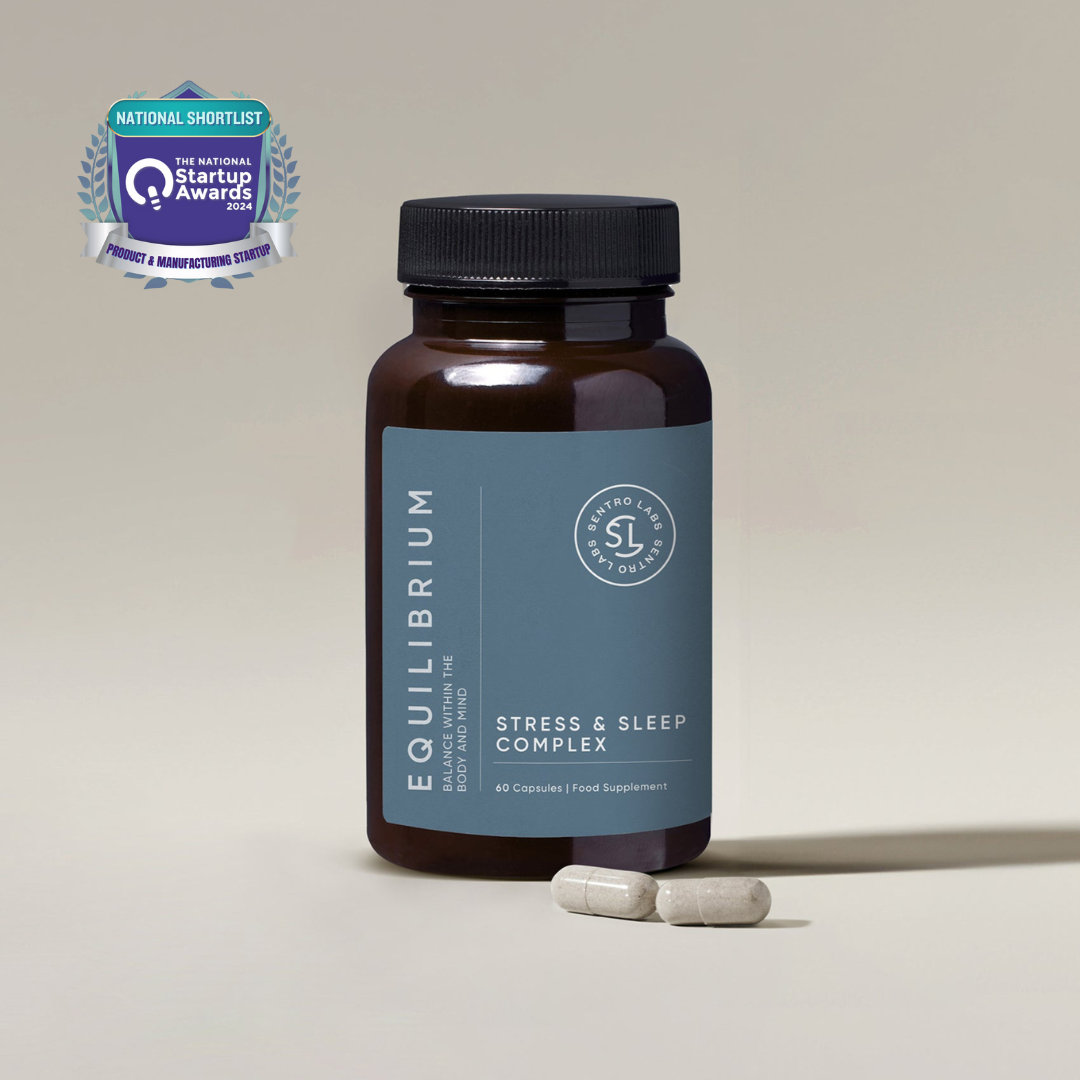


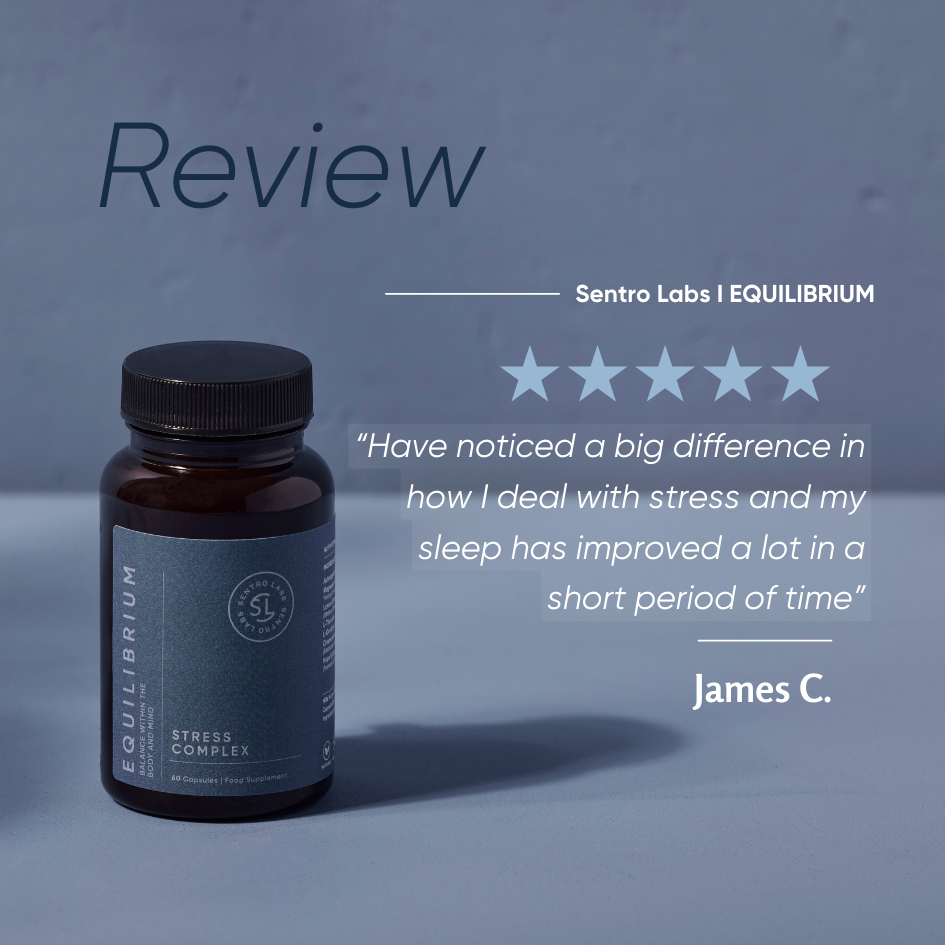

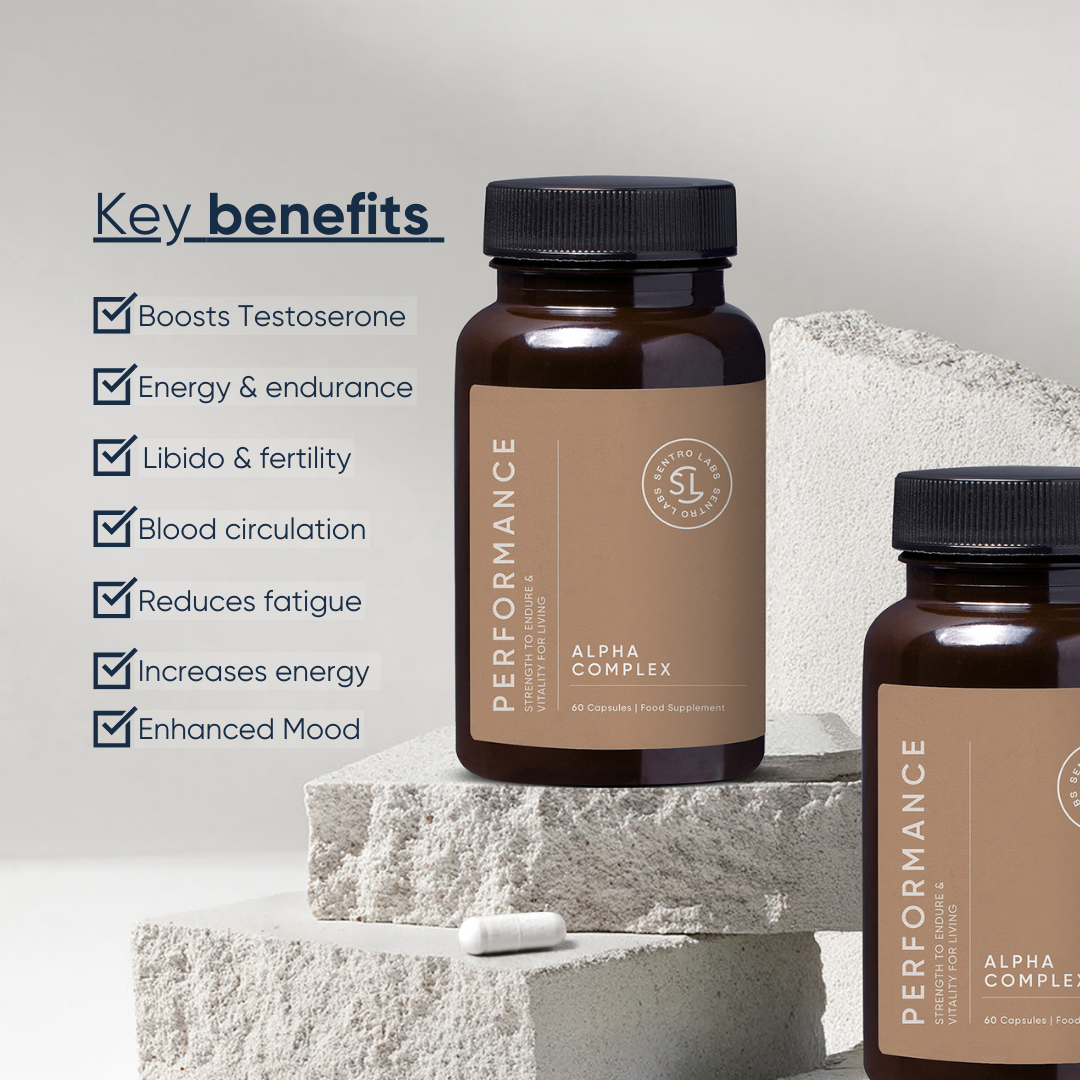
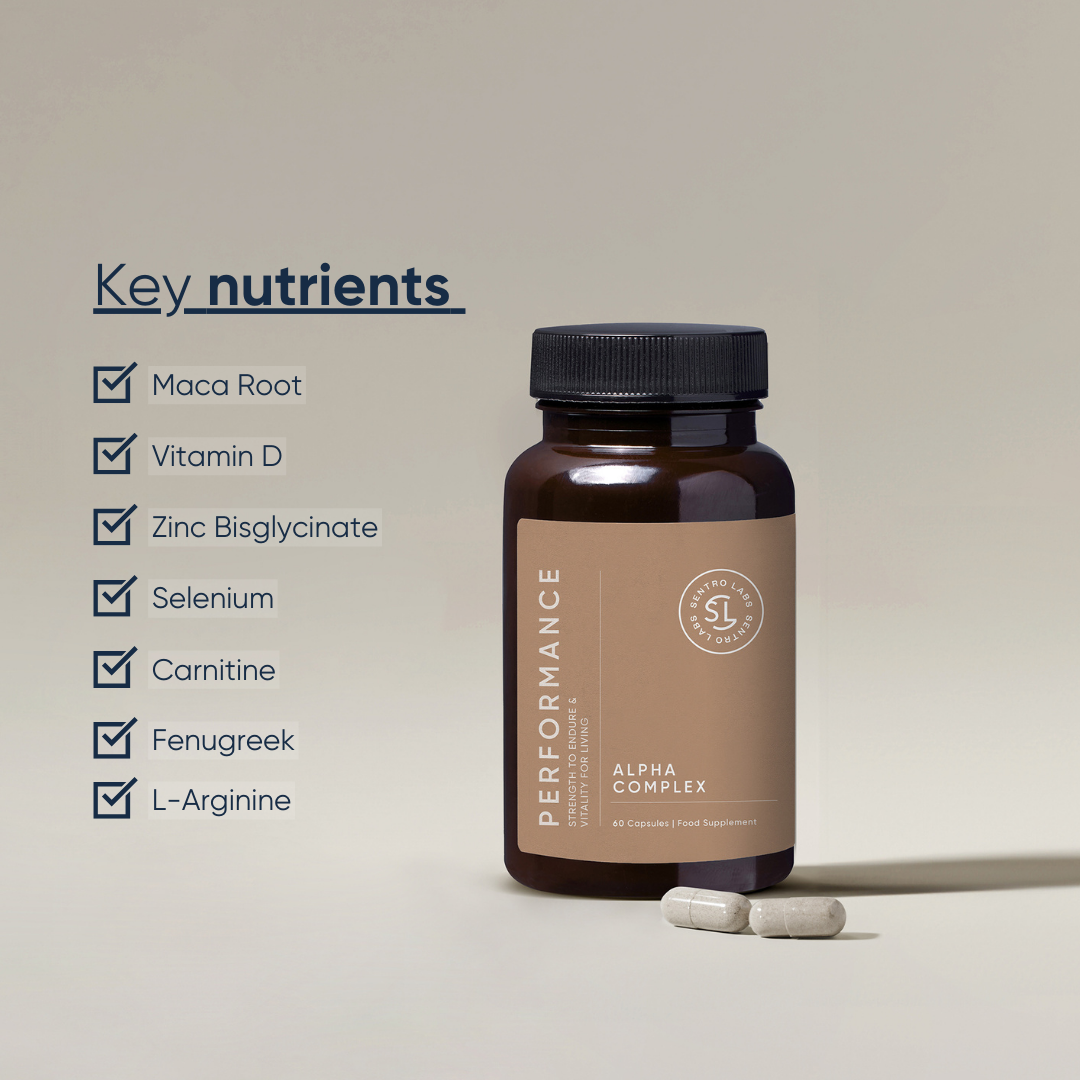
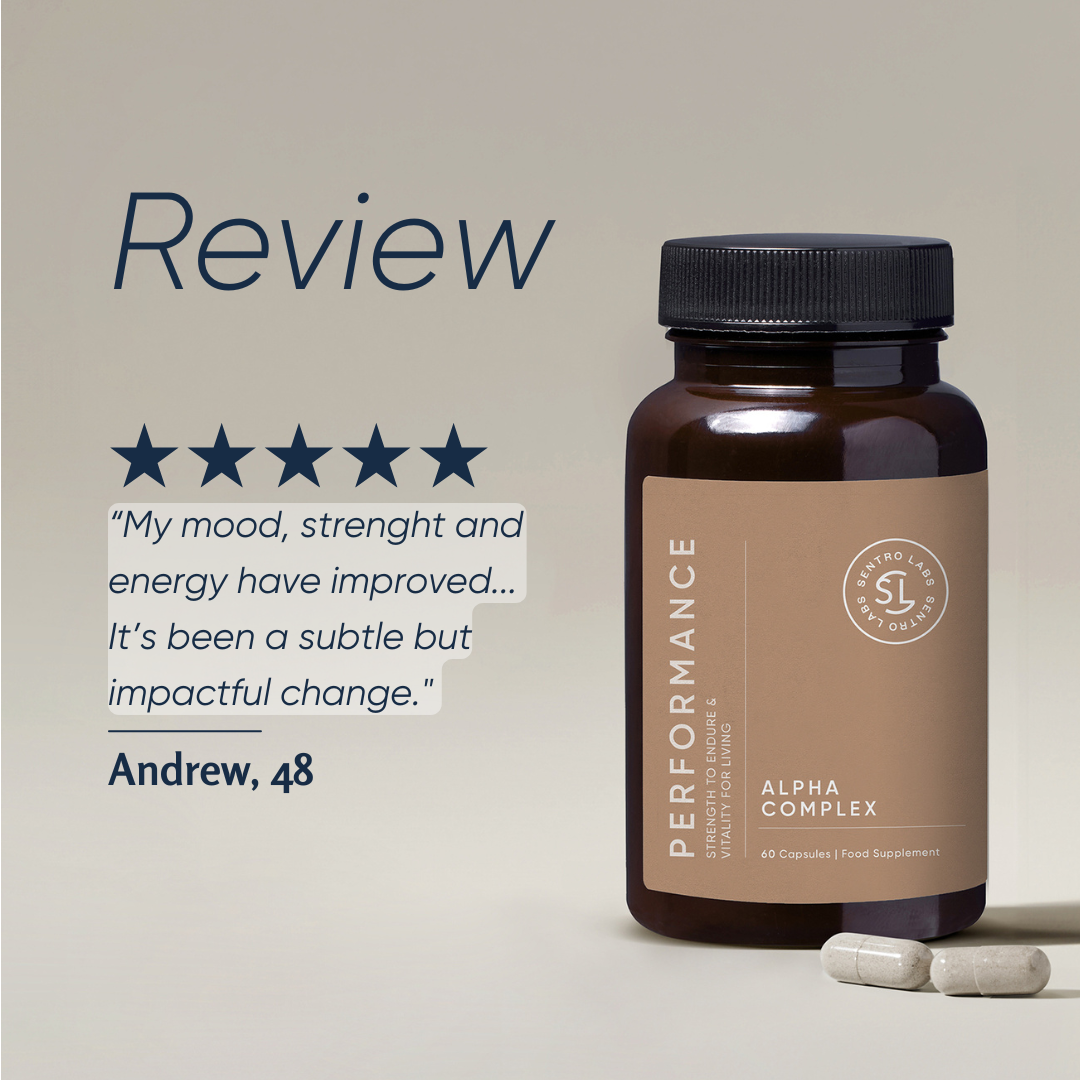
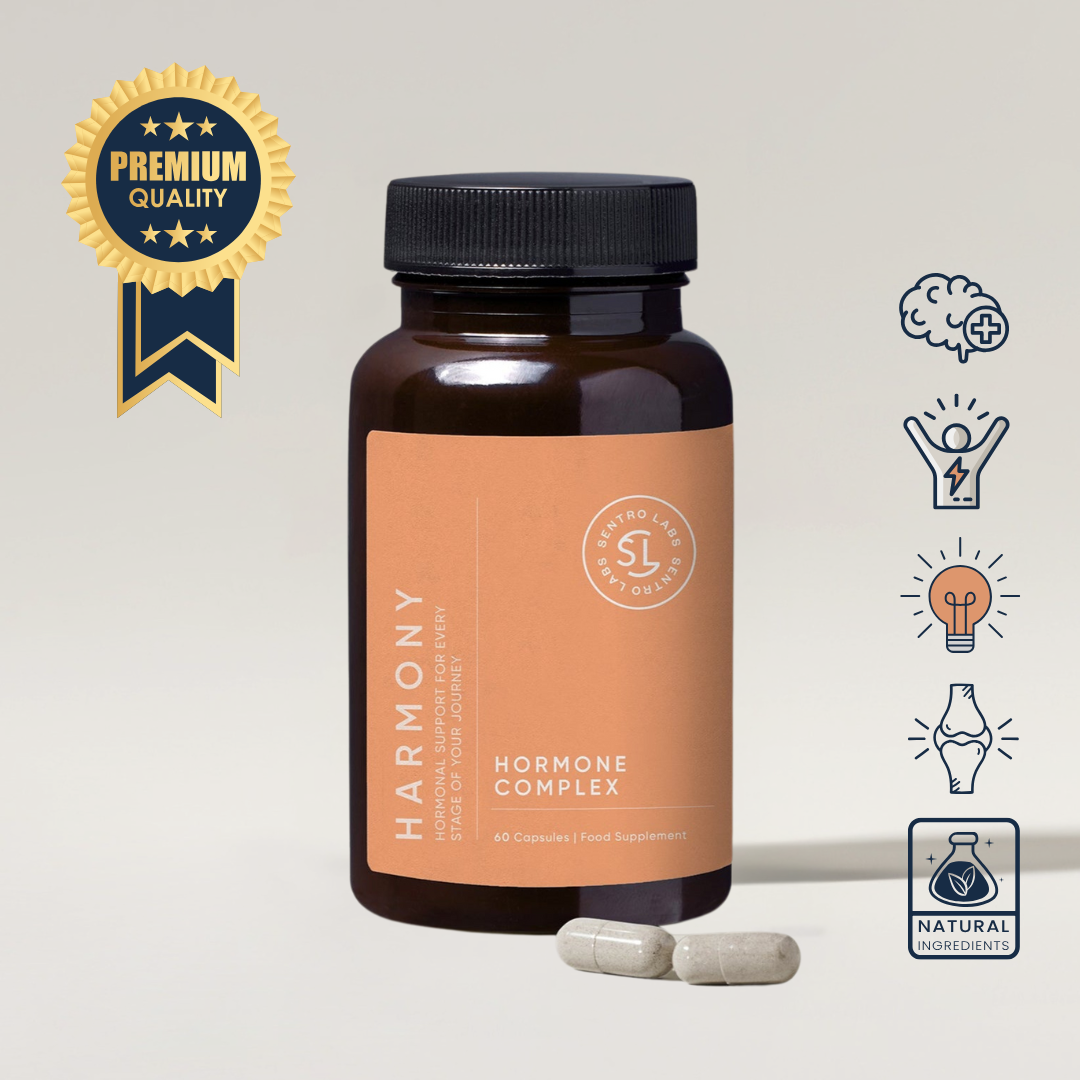
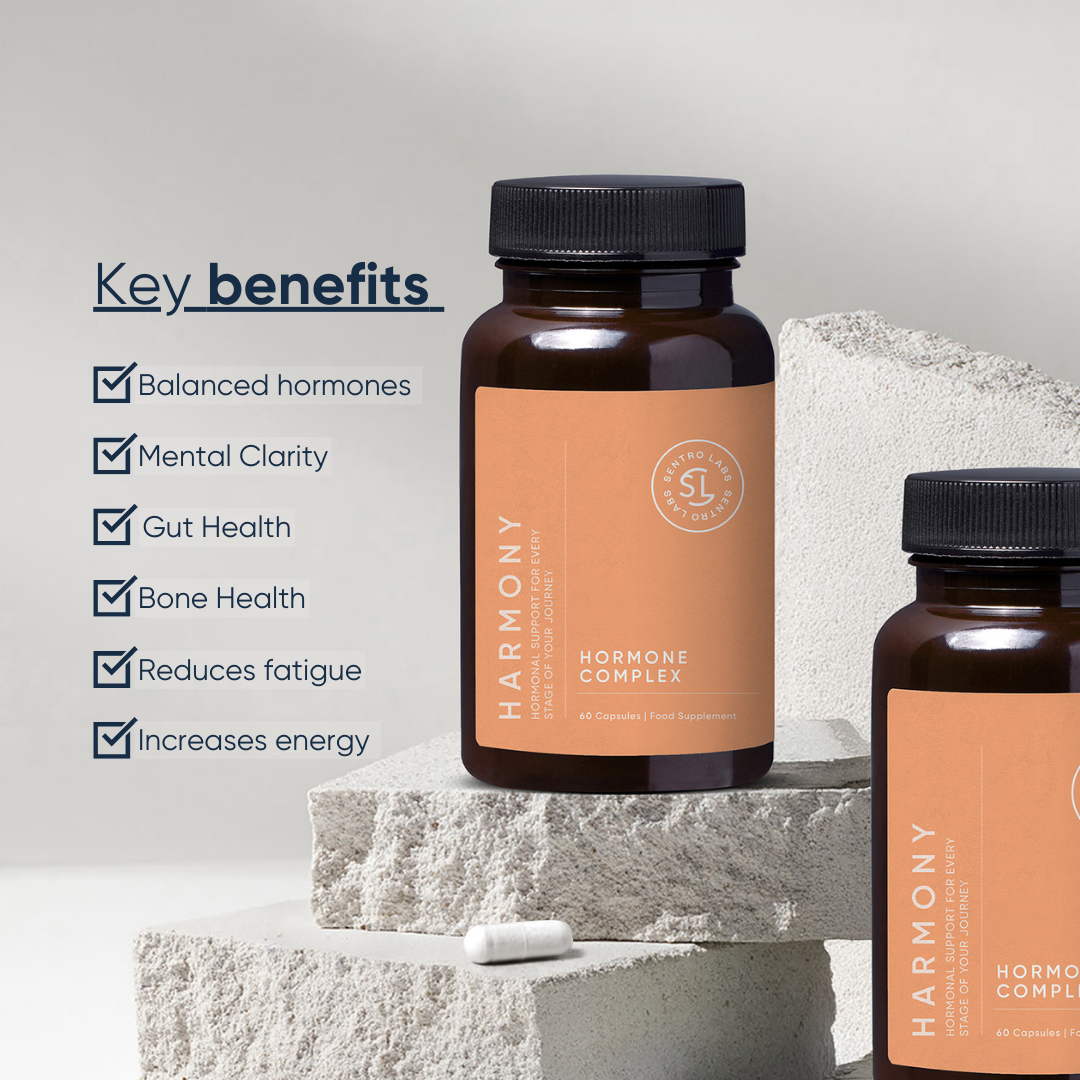

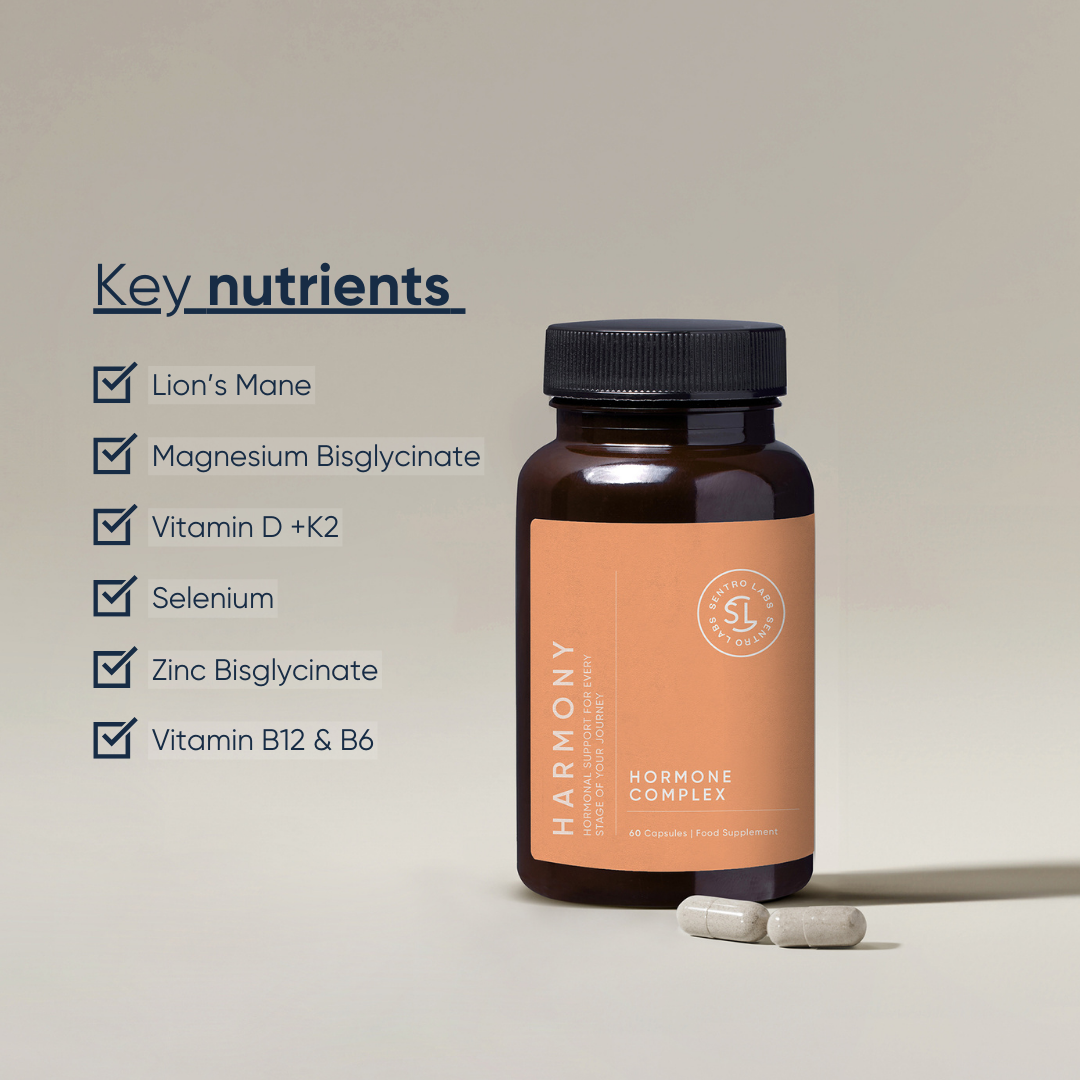


Share:
The Benefits of L-theanine